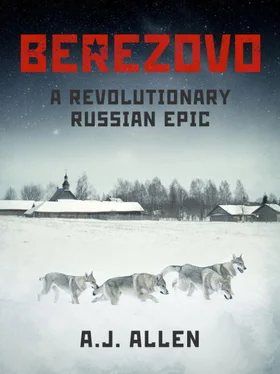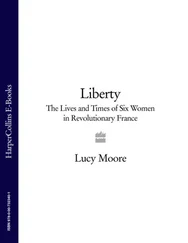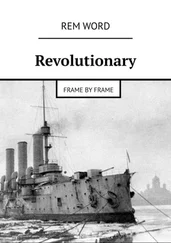Wrapping his arms around himself, Trotsky thrust his fingers under his armpits, seeking the last vestiges of his body’s warmth as he read through what he had written. The cold made concentration difficult. He had lost nearly all sense of feeling in his toes. He considered whether or not he should remove his boots. His greatest anxiety was that during the night they would be stolen, either by one of the soldiers or by the man who owned the house in which they had been billeted. He knew that some of his fellow exiles thought him vain for wearing boots more suitable for strolling along the Nevsky Prospekt than for a sentence of enforced settlement within the Arctic Circle. Already his footwear had entered the vernacular of the journey. Someone had only to say, “As smart as Trotsky’s boots!” to raise a laugh. Their mockery didn’t bother him, but the boots undoubtedly were tight and his feet were now numb. He decided that he would take the boots off tonight and sleep with them under his pillow.
Re-reading his description of their passage through the forest, he nodded to himself. Natalya would appreciate that. She was always accusing him of only noticing what she called the ‘material dimensions of matter’. (“ LD, a good socialist should be worldly enough to recognise both the value and the cost of such intangibles as nature and art.”) Objectively, much of the landscape through which he had been transported had been beautiful, with the clean ridges of snow taking the shapes and textures of freshly whipped meringue. Lifting his eyes from the letter, he gazed at the patterns on the darkened glass of the window in front of him. Little beads of ice swirled and spread, like ferns pressed flat against the pane.
If Natalya was here instead of me, he thought, she would have drawn that. She would not have needed to write.
Truly there were other modes of expression that could be used. Alas, he was only skilled in the written word and, as poor as it was, it had to suffice.
Re-reading the end of his last paragraph he wondered if she would appreciate the truth of what the old crone had said, for surely they were the ‘chiefs of all the politicals’ now. One could not count Nicolai Lenin’s criminally manipulative leadership of the Moscow workers.
Now there, he thought, was a man who saw life in only one dimension if ever there was.
A muffled snore from one of the bodies asleep on the hard wooden floor made him turn his head and gaze down upon the figures around him. In the centre of the floor lay Dr. Feit. Seeing him there, Trotsky smiled. He had grown fond of the old man during the weeks since the trial had ended. Within hours of the commencement of their journey into exile, the doctor had assumed the role of leader with the tacit but unanimous approval of the group. Without friction or rancour, he had succeeded in organising the families who had chosen to follow their men into exile and had sat for hours during the seemingly endless train journey telling the children folk tales to keep them amused. All the ‘privileges’ they had wrung from their guards had been due to the doctor’s skill as a negotiator. Each meal they had eaten on the train he had cooked personally and had often managed to provide a choice of dishes. In return, the affection that the exiles felt for him was the greater for not being blind gratitude. They all recognised that, by becoming both master and servant, the doctor was merely reacting to the circumstances in which he found himself. This was his method of coping. There was nothing like the hardship and uncertainties of exile to bring out the true nature of a man and Dr. Feit was a good man.
“What a pathetic lot,” Trotsky muttered aloud.
As if in answer, another man murmured and turned uneasily in his sleep. Moving the oil lamp nearer to the piece of paper, Trotsky turned up its wick. Then, picking up his pen, he dipped the nib into the shallow pool of ink and wrote:
Tonight we are staying in a large clean room with papered walls, American cloth on the table, a painted floor, large windows, two lamps. All this is very pleasant after those other filthy places. But we have to sleep on the floor because there are nine of us in the room. They changed our escort in Tobolsk and the new escort turned out to be as rude and as mean as the Tiumeni one had been courteous and well disposed towards us. This is due to an absence of any officers. The soldiers feel responsible for everything that might go wrong, But I must add that after only two days they have thawed considerably and we are establishing excellent relations with them, which is far from being a mere detail on such a journey.
Laying down the pen again, he held his hands close to the bowl of the lamp, trying to coax some warmth back into his chilled fingers as he thought of what else he could tell Natalya. Whatever happened after they arrived in Obdorskoye, he knew it would be different from his first exile. Now he was unencumbered; then he had been shackled to his wife and had had to waste two years doing odd jobs to feed the babies.
No , he corrected himself, not wasted . He had found time to read and had even written his first articles for the Eastern Review in Irkutsk. At the time how proud he had been of them! Now they seemed as amateur as the purple inked broadsheets he and Alexandra had produced for circulation amongst the bemused workers of Nikolayev and Odessa. As early as his days in Odessa at the St Paul Realschule, he had yearned to write. Even though old Krizhnovsky had marked him out from the first as an outstanding pupil in Russian, nobody had encouraged his gift for words. Pointing to his gift for mathematics, they had been assured that his future was secure. But what could he have become? An accountant? A professor? No – rather a thousand Obdorskoyes than that! He had taken the alternative. Rather than acceptable exile by his own academic talent to some dreary provincial academy, he had followed his heart and had become Pero – ‘The Pen’ – using every nib now as a scalpel and now as a dagger to lay bare and skewer the rotten society in which he lived. Instead of a provincial accountant he had become internationally known as a revolutionary writer; for so the historical record would regard him.
Staring into the lamp, he thought of Alexandra, Grigory, Illya and Ziv. Sitting in this freezing and ill-smelling room he found himself a long way from that sunny nursery garden where the five of them used to meet to discuss politics and to plan subversion. Frowning he tried to recall the name of the old peasant who had let them use his hut as their ‘hideout’. What was he called? Shipansky? Shibilsky?
He had seen Ziv only eight or nine months previously, quite by chance in the House of Preliminary Detention. For half an hour they had shared the same exercise yard. Ziv, at least, had not changed: he was just as shy as ever. Whether it was because of that, or the different paths they had taken, Trotsky was not sure, but they had exchanged no more than a few minutes’ conversation. Yes, Ziv had seen Trotsky’s wife, Alexandra: she was looking old and worn out. Both of his daughters, Zina and Nina, were well. There was no news of their uncle Grigory. Illya was rumoured to be dead. That was all.
Shvigorsky, that was it. The gardener’s name had been Shvigorsky.
Trotsky removed the pince-nez from the bridge of his nose and, leaning back in his chair, rubbed his tired eyes. Remembering Ziv’s news brought back the memory of the last time he had seen Alexandra at the exile settlement at Verkholensk.
Escaping from Verkholensk had been easy.
No , he corrected himself. She had made it easy for him.
It had been autumn and security had been minimal. He had heard later that it had taken the local police two weeks to discover the dummy he had left in his bed. And he hadn’t been a Somebody then; just L.D. Bronstein, another snot-nosed student on the run. Even now he could remember the terrible excitement he had felt lying quaking beneath the bundles of hay in the peasant cart as it rolled slowly past the western gate of the settlement, expecting at any moment to hear the guards’ shouted order to halt. Discovery would have meant an extra three and a half years’ penal servitude. As it was, it had been a miracle that one of the cart’s wheels had not been smashed on the long road to Irkutsk.
Читать дальше












